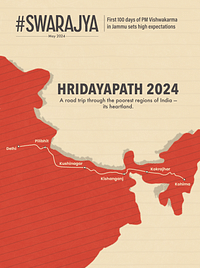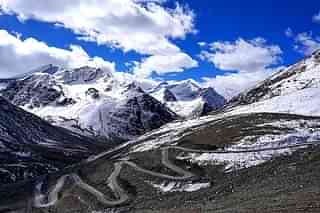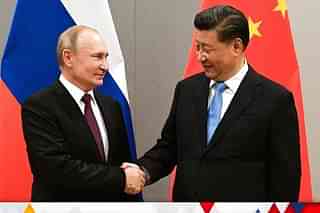Culture
Harmony In Discord: One Of The Oldest Fights On Twitter Doesn't Look Like Ending
K Balakumar
Apr 30, 2024, 02:46 PM | Updated 03:06 PM IST
Save & read from anywhere!
Bookmark stories for easy access on any device or the Swarajya app.

A few years back, at a get-together of the South Indian community in a European country, I was waiting for the function to start even as they were playing film songs on the in-house tannoy.
I was too engrossed in some chat with an acquaintance, it didn't register within me as to what music was being played on the audio system. But sometime later, there was some commotion as we could hear some loud words being exchanged between what appeared to be two sets of people.
The heated argument soon degenerated into a full-blown verbal war, and those who were closer to the passionate verbal joust parlayed the news that it was over whose songs should be played. Ilaiyaraaja or A R Rahman's?
The fans of ARR in the group suggested that their music director's songs were more trendy and catchy, and did justice to the capability of the high-fidelity speakers and music system.
The followers of Raja's music counter-argued that his music was beyond comparison, and more layered and hefty. Such anguished arguments have been made thousands of times between various groups over several years across platforms. But to actually see it happen thousand miles away from India in an alien setting was both revealing and funny.
It is known that fan wars are no respecter of geographical contours. I have sat through impassioned fights between Arsenal and Manchester United supporters on a dark night in Madurai. Once on a flight to Colombo, I could overhear a husband and wife spar over Federer and Nadal. Back in our school days in the 80s, we literally exchanged blows over Rajini and Kamal films. But even within the extreme world of fandom and hero worship, the Raja-Rahman fan clashes are a special breed.
And it is something that has dominated spicy squabbles on X (Twitter) over one-and-a-half decades. On the social media platforms, the passionate Rahman followers are known as 'maniacs,' while Raja devotees are called 'mafia'. And as one would expect from groups with such strong and polarising names, it is often no-holds-barred and free-for-all disputes between the two.
The difference in Raja and Rahman's musical approach
Rahman fans say he has revolutionised Indian film music with his groundbreaking fusion of traditional sounds and contemporary elements, and stands as a global icon after earning accolades including the Oscars and the Grammys.
Ilaiyaraaja, on the other hand, embodies a golden era of melody and rhythm. With a career spanning close to five decades, he has composed over several thousand songs in multiple languages, leaving an indelible mark on Indian cinema. His songs are timeless melodies, as they are the epitome of musical purity and depth.
Amidst the cacophony of opinions, the discourse often takes a contentious turn. Tweets devolve into heated arguments, with fans fiercely defending their musical deity while disparaging the other. Hashtags like #TeamRahman and #IlaiyaraajaForever dominate timelines, fueling the flames of rivalry.
Last week, the never-ending fight again came to a simmer, thanks in the main to an article by the famous Tamil writer Jeyamohan. He lit the fuse with a schematizing piece in which he compared the music of Raja and Rahman and declared in no uncertain terms that Rahman was as much a genius as Raja is, despite the fact that the two have such contrasting working styles.
This well and truly set the cat among the pigeons as far as Raja backers are concerned. For, they are of the strong opinion that Rahman is less a music composer but more an assembler or producer of songs. Rahman, as is well known, lets his singers and instrumentalists explore freely a musical idea and then gets down to work with what they offer.
He has a great ear for what would work as a final output and keeps tweaking and fine-tuning what his collaborators provide him with. This modus operandi, Raja fans allege, is essentially musical packaging and does not fit in the ideas of conventional film music composing.
Ilaiyaraaja's working pattern is decidedly different and is now part of the film music lore of India. His process is uncomplicated and begins the moment a director walks in and asks for a song for a particular situation.
Raja, hunched over his iconic harmonium, listens to the idea and in a matter of minutes or even seconds comes out with the barebones of a tune. If the director is okay with it, he continues with it, or if the director is less convinced, the musician instantly comes up with another musical idea. If a tune is accepted, Raja quickly writes down the various orchestral pieces that would make the song.
The whole thing, as vouched by almost everyone who has worked with Raja, lasts only a few minutes. The man is known to have composed songs for an entire film in less than half an hour. That is how fertile his musical imagination is.
The fact that Raja has been so prolific and spectacular in his musical methods makes his fans lay the claim that he is far superior to other music directors, especially Rahman, whose ways are more elaborate and collaborative.
Jeyamohan’s contentious opinion
Jeyamohan, who is now part of the film industry as a writer and has worked with both Raja and Rahman, went into depth about the approach of both musical stalwarts. Jeyamohan said Rahman added a new musical motif with every iteration of a song and it is a staggering skill to keep improving every version. It takes great creative vision to pull something off like that, Jeyamohan said.
And his final takeaway was that despite all the differences in style and system, Rahman was a maestro on a par with Raja, and belongs to the next generation.
Such a definitive pronouncement from a man who is musically not ignorant has stirred the hornet's nest and Raja's fans have been having a go at the writer with choicest epithets. They have put a vehement analysis of Jayamohan's piece and tried to pick holes in his reasoning.
Jeyamohan's impugned article itself was a result of another controversy kicked up due to the claims made by filmmaker Ram Gopal Verma. In an interview, the controversial director-producer, under whom Rahman made the stunning splash in Bollywood through the remarkable Rangeela (1995), claimed that the Oscar-winning song Jai Ho was actually a creative concept of singer Sukhwinder Singh.
In that interview Verma also said that the song was originally suggested for Subhash Ghai's Yuvraj (2008), and since the director was unimpressed by it, the same was used by Rahman for Danny Boyle's Slumdog Millionaire (2008). Naturally, the interview created a storm, and Raja fans, among many others, used it to troll Rahman's followers.
However, the issue was kind of settled when the singer in question, Sukhwinder Singh, in an interview with Hindustan Times, cleared the air by stating that the Jai Ho song was Rahman's creation and only, what was given to Ghai was his recording of it.
Jeyamohan said that both Raja and Rahman were being targeted because they are achievers. The reasons for criticism are just 'common man's grudge,' he opined.
Anyway, his piece has reignited the Twitter timeline again, and this time around the skirmish has also taken some political turn.
In the digital arena, where opinions clash and egos collide, this Twitter war serves as a microcosm of broader societal tensions. Sections of the Dravidian followers have been putting down Raja as he had praised Modi and offered the preface to a book comparing the Indian Prime Minister to Ambedkar.
Raja has also spoken positively about Ram temple in Ayodhya. Rahman fans have tried to project him as a Tamil icon (even though he has been equally busy in Hindi over the years).
Beyond being a mere virtual slugfest, the Twitter war between Rahman and Ilaiyaraaja fans reflects a deeper cultural divide. It often blurs the line between appreciation and fanaticism. The clash threatens to overshadow their shared legacy, perpetuating discord where harmony should reign.
Save & read from anywhere!
Bookmark stories for easy access on any device or the Swarajya app.
Support Swarajya's 50 Ground Reports Project & Sponsor A Story
Every general election Swarajya does a 50 ground reports project.
Aimed only at serious readers and those who appreciate the nuances of political undercurrents, the project provides a sense of India's electoral landscape. As you know, these reports are produced after considerable investment of travel, time and effort on the ground.
This time too we've kicked off the project in style and have covered over 30 constituencies already. If you're someone who appreciates such work and have enjoyed our coverage please consider sponsoring a ground report for just Rs 2999 to Rs 19,999 - it goes a long way in helping us produce more quality reportage.
You can also back this project by becoming a subscriber for as little as Rs 999 - so do click on this links and choose a plan that suits you and back us.
Click below to contribute.





